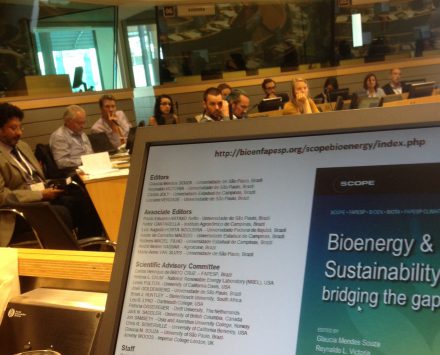
On 17 June 2015, the Scientific Committee on Problems of the Environment (SCOPE) presented a Policy Brief with policy recommendations from the recently launched 779-page report on Bioenergy and Sustainability. More than 30 participants from the European Commission, NGOs, industry and other stakeholders participated in the launch during the European Sustainable Energy Week in Brussels. Leading authors summarised the full assessment, a joint effort by 137 researchers from 24 nations. The conclusions that land availability is not a limiting factor and that bioenergy can contribute to sustainable energy supplies, even with increasing food demands, preservation of forests, protected lands, and rising urbanisation were discussed in view of the policies needed to achieve positive synergies for food and bioenergy production.
The discussion in Brussels focussed on the impact of bioenergy on biodiversity, social development and the need for sustainable agriculture. It was generally agreed that long term consistent policies are crucial to fight climate change, but also to ensure that bioenergy production can indeed change unsustainable agricultural practices. Food security is a major challenge, but as Patricia Osseweijer from TU Delft and lead author of the bioenergy and food security chapter points out: “Food and energy insecurities still affect nearly one billion people, of which 75% live in rural areas. In these areas, the traditional use of biomass for cooking still dominates with major health and environmental issues. Especially there modern biobased technology can really make a difference and help to stimulate social development and improve food security.”
The SCOPE report provides results from practical case studies of adapted biobased technology, bringing both environmental and health improvements, and also stimulating social development. The presenters concluded that the transition to a biobased economy is urgent if we wish to help to alleviate climate change. It can be done with positive synergies, but this requires aligned and long term policies and financial investments.
Van der Wielen sees the report as an important contribution for such policy development. He comments: “This reports uniquely brings together the latest figures on land availability and technology options, while reflecting on realistic options to create positive impacts for the environment and social development. It provides balanced steering for policy for the research agenda as well as for governance”.
The report and policy brief is a collective, interdisciplinary effort led by SCOPE, research foundation FAPESP (including the BIOEN, RPGCC and BIOTA programs) and BE-Basic Foundation, an international public-private partnership. Researchers from BE-Basic contributed to 9 of the 21 chapters from the SCOPE report , involving Hans van Meijl (Wageningen University), Luuk van der Wielen and Patricia Osseweijer (Delft University of Technology) and Andre Faaij (University Utrecht).
The new Policy Brief and the full SCOPE report can be downloaded at: http://bioenfapesp.org/scopebioenergy/index.php.
About SCOPE
The Scientific Committee on Problems of the Environment is an international nongovernmental organisation founded in 1969. SCOPE is a cross-sectoral and trans-disciplinary network, connecting experts and institutions around the world. It is recognised for its authoritative, independent and influential scientific analyses and assessments of emerging environmental issues that are caused by or impact humans and the environment. It collaborates with inter-governmental agencies such as UNESCO and UNEP and with other partners in the development of its scientific program and outreach activities.
About BE-Basic
BE-Basic Foundation is an international public-private partnership that develops industrial viable, safe and ecologically friendly biobased solutions for the Biobased Economy. Our aim is developing true innovative bio-chemicals, bio-materials, bio-construction concepts and biobased monitoring tools. Societal embedding of the products, services and processes developed by BE-Basic are essential and is addressed specifically. More information can be found at: www.be-basic.org.
About BIOEN
BIOEN, the FAPESP Bioenergy Research Program, aims at articulating public and private R&D, using academic and industrial laboratories
to advance and apply knowledge in fields related to bioenergy in
Brazil. Research ranges from biomass production and processing to biofuel technologies, biorefineries, sustainability and impacts
About RPGCC
The FAPESP Research Program on Global Climate Change (RPGCC) aims at advancing knowledge on Global Climate Change and guide decisions and policy in the field.
About BIOTA
The BIOTA-FAPESP Program (FAPESP Research Program on Biodiversity Characterization, Conservation, Restoration and Sustainable Use), aims not only at discovering, mapping and analyzing the origins, diversity
and distribution of the flora and fauna of the biomes of the state of São Paulo, but also at evaluating the possibilities of sustainable exploitation of plants or animals with economic potential and assisting in the formulation of conservation policies on remnants of native vegetation.

